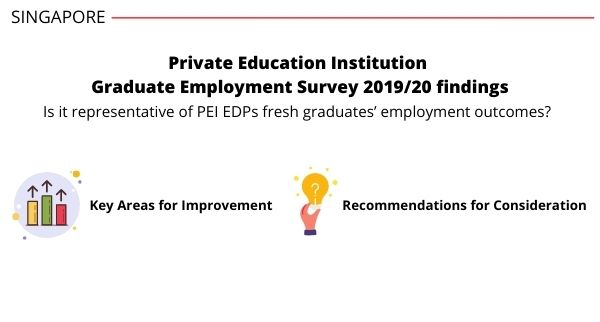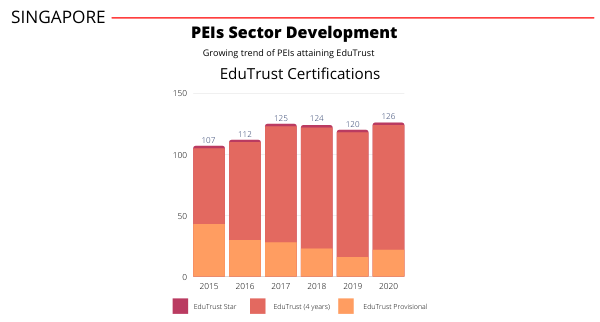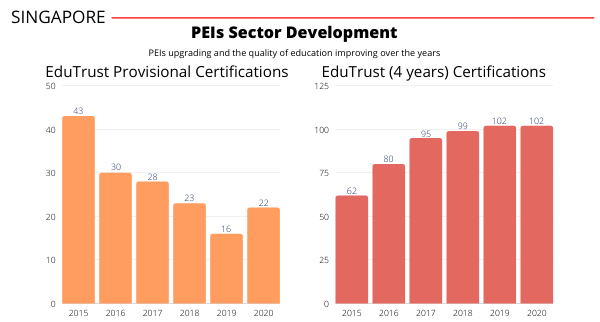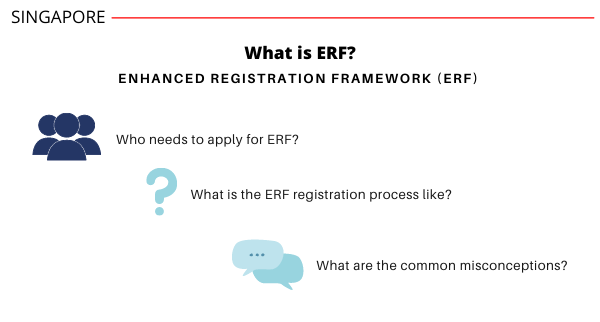From 2020 to April 2021, 15 PEIs downgraded, lost their EduTrust or deregistered. Of which, 10 PEIs downgraded from 4-year to 1-year EduTrust, 4 PEIs did not maintain and was not awarded EduTrust, and 1 PEI deregistered. Based on our research, conversations with these PEIs and the auditing of their documents, we postulate that the following areas that might affect PEIs ability to maintain their EduTrust Certifications.
1. PEIs staff struggle to adapt to changes in meeting regulatory requirements that will allow them to maintain or upgrade their EduTrust Certification status. Depending on whether it’s a Provisional or 4-Year EduTrust, PEIs renew their EduTrust once every few years and in-between certifications there may be changes to CPE’s assessment methodology. As such, the PEIs may not have been updated of the new methodologies and/or new focus areas of CPE assessors and were taken aback by the degree of changes. Hence, they did not fare well for the assessment.
2. Many PEIs that were downgraded also did not adhere to latest guidance document, GD3 and were relying on the outdated GD2 in their renewal process. This could also be a result of staff using guesswork to understand the changes, or resignation and turnover issues during key assessment periods where CPE reviews a sample of the renewal application.
3. Additionally, the absence of an independent audit function allows staff to sweep things under the carpet for years until the next recertification cycle where the issues resurface. These audits also lack objectivity, and transparency as they are carried out by internal employees. In fact, many of the CEOs of PEIs that were downgraded have shared that they were taken aback by the comments from CPE during assessment as most of the time, the internal Quality Assurance (QA) Department has surfaced no issues during the years leading up to the audit.
4. Another interesting fact was the reliance on one-man consulting firms with small capacity that provide outdated information. Due to the nature of the kind of traditional consulting given by these one-man consulting firms, the lack of integration of actual regulations with operations were actually making PEIs regress in areas of QA and compliance to regulations.
Losing or being downgraded in EduTrust certification can have a significant impact on your businesses and students. Pathway and degree programmes are affected and PEIs have to teach out immediately once they are downgraded. These not only affect your PEI’s Brand but also the future of their students. Here are some of EduValue’s recommendations to minimise PEI’s risks of losing or downgrading your EduTrust certification.
1. Having an external audit function will increase independency of the audits.
2. Not leaving the critical EduTrust certification applications to just one employee where risks of competency, outdated information or resignations can cripple your PEI.
3. Before hiring your internal QA or consultants, analyse their track record and test how current they are with the latest regulations. Always ask them, ‘how many 4-Years EduTrust Certifications have they helped to renew successfully and/or upgrade in the last 3 months?’ Past records and current track records provide you with a comprehensive understanding of the competency of your employees in EduTrust certification applications.
4. Do not wait until it is too late for any rectifications. Take pro-active measures and/or steps to minimise the risks involved and increase your chances in submitting a successful application.
If you have any concerns and would like a non-obligatory discussion with regards to your EduTrust Certifications, our Singapore Entity (EduValue Singapore) would like to set-up a session where we can look at some of your documents and/or systems and to give any recommendations that may benefit you.
Contact us at support@eduvalue.com.sg We’ll love to help and to connect.
Read our previous article on EduTrust and if it is difficult to attain
Find out more in the Market Analysis of Singapore’s PEI Sector (2015-2020)
Data compiled through the monitoring of CPE’s PEI Listing and Deregistered PEIs
Written and graphic design by Gillian Koh, Industry Research Team at EduValue





